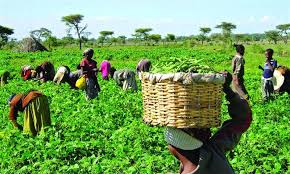As Nigeria grapples with an acute food shortage, Abubakar Kyari, the Minister of Agriculture and Food Security, has shed light on the underlying reasons behind the crisis and outlined measures being taken to address the situation.
In a recent interview on Channel Television’s Sunday Politics, Minister Kyari pointed to several factors contributing to the food shortage, including seasonal effects, reduced landmass, flooding, and other challenges. The impact of these factors has been reflected in a 40 percent food inflation rate, making essential commodities financially out of reach for millions of Nigerians.

Explaining the current lean season between June and July, Minister Kyari highlighted the significant issues faced in agriculture during this period. He emphasized the impact of land shrinkage, flooding, habitation problems, and insecurity, all of which have added pressure to an already strained agricultural sector. Additionally, an aging farming population and a declining interest among younger individuals to enter the agricultural sector have further compounded the challenges.
To combat these issues, the Federal Government has rolled out measures to boost food production. Minister Kyari disclosed plans to scale up farming activities, increase mechanized farming, distribute fertilizers to farmers, and acquire tractors to enhance agricultural operations. Notably, during his visit to Belarus, he placed an order for 200 tractors and 9,000 other farming implements, underscoring the commitment to modernize agricultural practices in Nigeria.
Speaking on the pressing need for mechanization, Minister Kyari highlighted the current reliance on archaic tools such as hoes and the necessity of transitioning to modern farming methods. He made it clear that this shift is crucial for increasing productivity and addressing the challenges faced by farmers across the country.
In the face of these obstacles, Minister Kyari assured the nation of an upcoming bumper harvest, projected to materialize around October to November this year. While expressing optimism about the potential for a significant harvest, he mentioned the importance of mitigating any potential natural hindrances that could affect the expected outcome.
As the government continues its efforts to address the food shortage, there is a shared sense of cautious optimism about the potential for improved food security in the near future. Minister Kyari’s reassurances on the upcoming bumper harvest have offered hope to many
Nigerians who have been impacted by the rising prices of essential food items. However, amidst these promises, there exists an understanding of the complexities and challenges that lie ahead in ensuring sustainable food security for the nation’s populace.
The Minister’s statements have shed light on the intricate web of factors contributing to the current food shortage and have underscored the need for comprehensive solutions to address the underlying impediments. The commitment to mechanized farming and the procurement of modern farming equipment signal a strong resolve to overhaul traditional agricultural practices and bolster food production capabilities.
As Nigerians await the development of the promised bumper harvest, it is evident that concerted and sustained efforts will be required to tackle the multifaceted challenges facing the agricultural sector. The resilience of the nation in addressing these issues will play a pivotal role in shaping the future of food security in Nigeria, ultimately impacting the well-being of its citizens.



